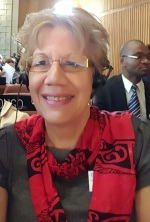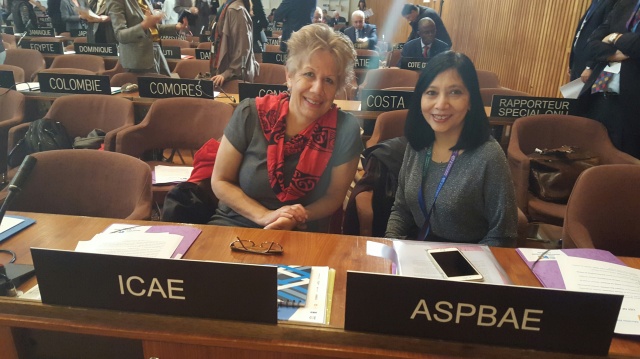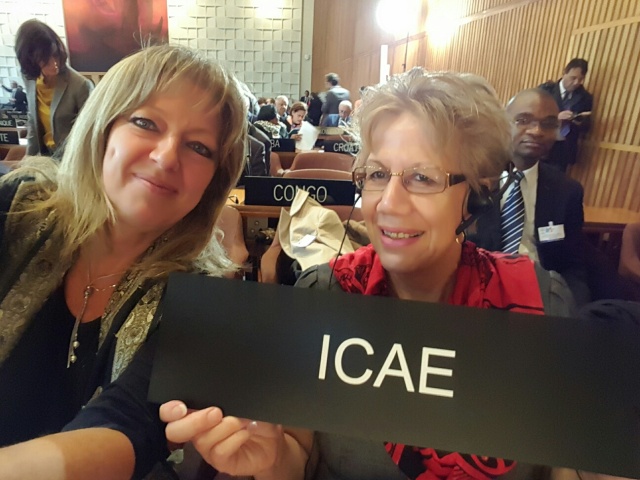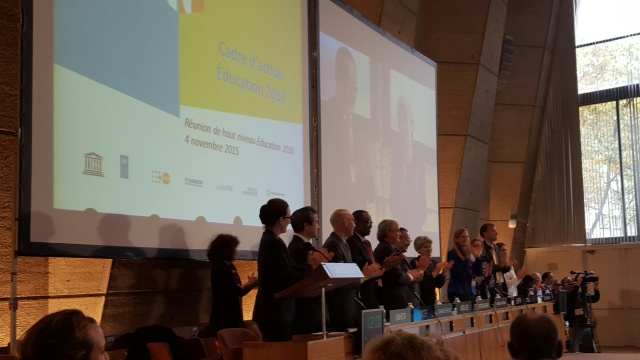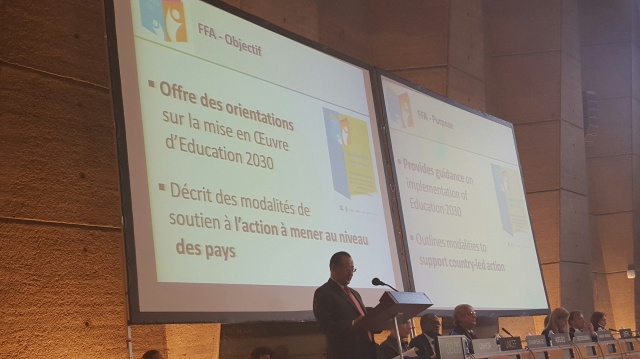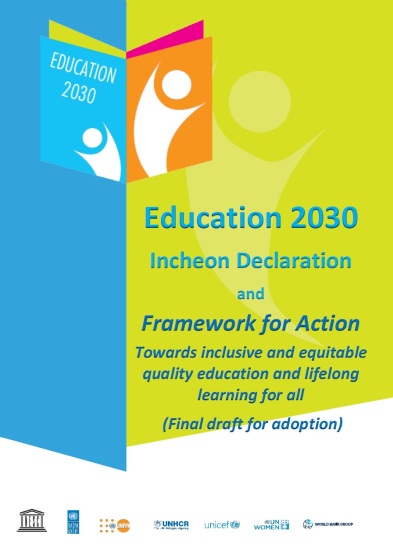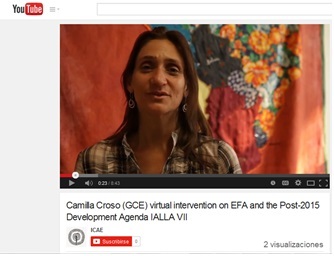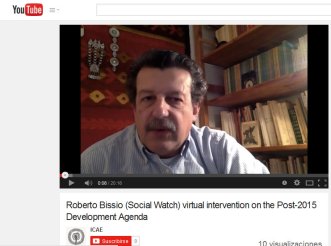By María Graciela Cuervo, Irene Lobo and Katarina Popović
This May 18-22 2015 UNESCO and other UN Agencies, will organize the World Education Forum 2015 (WEF 2015) in Incheon, Republic of Korea. The outcomes of WEF will be aligned to the new Sustainable Development Goals (SDG) to be adopted by UN High-Level Summit in September 2015. In order to ensure regional perspectives and input, Regional Preparatory Conferences were organized in 2014 and 2015, with Regional Statements that will ’flow’ into the WEF.
According to UNESCO, there were two objectives:
– To take stock of regional progress in education, in particular EFA, yield lessons learnt for the future and examine persisting and emerging issues, challenges and priorities for education beyond 2015; and
– To develop and agree on regional recommendations for the post-2015 global education and development agendas, including the international framework for action to be adopted at the World Education Forum 2015, Incheon, Republic of Korea.
Regional reports precede all the conferences and the expected outcome was a document with recommendations for education post-2015, which will serve as regional contribution to the international framework for action to be adopted at the World Education Forum in Korea.
Civil society has actively taken part on each of the preparatory conferences – for some of them there were even pre-meetings where civil society representatives gathered and discussed their objectives for the respective meeting and the common strategy, there were slots in the drafting committees of the conferences, some of the discussions in the plenary and in the workshops were open for the representatives of civil society.
ICAE and its members and partners made an important contribution to the achievements of the conferences and to the final statements.
The conference for Asia Pacific Region was held in Bangkok, Thailand, from 6-8 August 2014. Civil society actively prepared for the conference, to ensure that the conclusions don’t slide from Muscat agreement and to try to get more, e.g. on adult literacy and specific asks on the indicators being proposed. In a Pre-meeting of CSOs, organised by ASPBAE at the front end of the ‘Asia Pacific Regional Education Conference (APREC)’, CSO decided about the priorities in the advocacy for the conference, related to basic education, skills and competencies, teachers, global citizenship education, education for sustainable development, and to governance and financing.
ASPBAE played an active role in the Conference – in speaking roles in various plenary and thematic sessions and was one of the two civil society representatives in the Drafting Committee of the Conference.
In the end, ASPBAE and partner CSOs, allies in government and other UN agencies were able to lobby agreements in the Asia Pacific Regional Education Conference (APREC) to support the Muscat Agreement but with bolder and more ambitious targets for the Asia Pacific – thus attending to the concerns of ASPBAE and CSOs on the gaps in the Muscat Agreement. The policy gains in APREC identified by the participating CSOs were in:
– Securing a commitment to target universal adult literacy and universal access to quality skills for life and work
– Commitment to 12 years of free and compulsory basic education (not just 10 years as contained in the Muscat Agreement) by 2030
– Stronger language on the importance of non-formal education and alternative paths to learning, especially attentive to the learning needs and contexts of marginalised groups
– Stronger language on quality learning environments (similar to the OWG call) while retaining support for the Muscat Agreement teacher target;
– Stronger language on reaching those in conflict and crisis situations and attention to people with disabilities.
– Thwarting a wholesale endorsement of PPP and innovative financing approaches with the condition that these should be directed towards strengthening the public education system
– Stronger domestic financing targets than the Muscat agreement
– Explicit reference for the Global Partnership for Education (GPE) to support the implementation of the post-2015 education agenda
Efforts to push for a financing target for education ODA however remained unsuccessful with sustained and strong resistance from donor countries to offer concrete targets and commitments to ODA. Donors have been pushing developing country governments to increase domestic resource mobilisation efforts to fund their education, health and overall development agenda while being slack in committing more through aid.
The conference for Latin America and Caribbean (LAC) was held in Lima, Peru from 30-31 October 2014. It offered the clear picture of the situation in the region, achievements and deficits. It was pointed out that none of the countries in the region, except Cuba, achieved the quality education goals. With regard to illiteracy it was noted that the largest gap is functional illiteracy of around 75 million people, which led to the appeal to close the post 2015 divide by the urgency of achieving a dignified life and opt for decent work. The importance of teaching and role of teachers was widely discussed through various aspects.
It is very important that the ministers from the region agreed about the recognition of education as a fundamental human right and the state as guarantor of rights. Moreover, the Minister of education from Uruguay urged for the education to live together, pointing out the lifelong character of education, the Minister from Peru invited to higher investment in education, Chile made a strong defence of strengthening public education, Cuba raised the importance of adult education and the role it plays in supporting the continent to address the issue of illiteracy, and Brazil was defending at least 12 years of free and compulsory formal education and quality education for all.
The important role of civil society in the region was stressed. Education based on the human rights, contributing to the inclusion, peace, multiculturalism and dignity of peoples’ life in all its senses was a strong message during the conference in Lima. In this sense, it was also noted that quality education shouldn’t be reduced to the measurements, and the criticism was expressed for the idea that private education ensure quality. Civil society was deepened the challenges of ALE and the need for universal literacy, and broadened the perspectives of “development”, pointing to the social and environmental justice. The need for another kind of approach to the researches was raised, as well as systematization to pick the best educational practices and the best thinking of Latin American educators.
Civil society did have the representative in the drafting group, but couldn’t comment the draft statement. As for the state representatives, Latin America gave comments in the spirit of education as a public good, some English speaking Caribbean was defending privatisation of education and the role of the private sector and companies.
The conference of the Arab Region was held on 27-29 January 2015 in Sharm El-Sheikh, Egypt, on a very high level and with very formal character with plenty of procedures. Although the globally discussed agenda was adopted, being held in a politically very sensitive moment, the conference discussions were marked by the recent events, and participants were guarded and accompanied by armed guards. The war in Syria and ISIS assaults influenced the discussions putting the focus on out-of-school children, children refugees, destroyed infrastructures, etc. But countries were insisting on their difference, so it was difficult to reach consensus in many issues. It was even more obvious in regard to the financial issues, having in mind differences among the countries, although the ministers have been reporting mostly about the achievements of the countries and less on gaps and needs.
Several topics were agreed in spite of differences – early childhood care and education, basic education of children, especially those jeopardized by war, education of refugees and education of girls and women, although the later wasn’t really deepened, but remained in the context of equity discussion, raised mostly by civil society. Adult literacy wasn’t, surprisingly, easily recognized as the priority – the discussion was more focused on quality education in general, and in indicators related to the access to education by all children. Down to earth approach could be observed in discussion of Jordanian minister of education; on the other hand, the idea of a need for more privatisation was criticised by several state representatives and education as a human right and public good was unanimously agreed, as well as financial target. The discussion about teachers was intensive, but also marked by the armed conflicts in the region.
Civil society had the representatives in the drafting committee and they had an eminent role in it. Although limited, the active role of civil society was enabled by UNESCO efforts and its engaged team, which was also supportive for rising the issues of lifelong learning and adult education. The possibility to speak in the inner circle when commenting the draft of the final statement was used, but strict time limit hindered more significant contribution at that point.
The conference for African Region was held in Kigali, Rwanda, from 9-10 February 2015, and gathered high number of participants, more than expected: high-ranking delegations, representatives of international organisations and civil society. The documents and papers were distributed timely.
Although the main objective of this, as well as of other conferences, was to provide regional input for further work of the Technical Advisory Group and EFA Steering Committee, the conference in Kigali discussed intensively global topics, but without giving the specifics of African countries. Poverty and hunger were hardly tackled, even AIDS only marginally. It was difficult to put adult literacy on the agenda, since it wasn’t recognized as the priority – instead of it, as Ethiopian minster said, education for productivity was put as the priority. This kind of agenda was uncritically adopted and discussed, goals, targets, indicators and all topics were embraced without examining critically the gaps and failures. It was obvious especially in total absence of the discussions about ODA, and lack of any criticism of educational role in international policies towards Africa. The privatisation was praised as the best way to increase access to education, „its quality and efficiency“, as Nigerian minister clearly stated. The role of the World Bank, that was present at all EFA preparatory conference, was especially strong at the African one.
It was interesting that ministers took active part in the work of the conference, not only in the plenaries, but also in a single session, and exchanged actively and non-formally with other participants.
Early childhood care and education dominated the agenda, which was stressed by the fact that the World Bank announced its programme of investing in the „first thousand days“ of a child, which was delightfully accepted. In this tone, lifelong learning was mentioned, but only as a framework, not as a real need. Education for empowerment and dignity didn’t play any role, and there were no many discussions about education in the context of environmental changes.
This was the only preparatory conference where coordinating role of UNESCO/UNICEF was doubted, but finally still accepted.
Civil society organisations, African and international, took part in the conference. They even had a one-day gathering, a meeting where topics and strategies for the participation on the main event were discussed. Plenty of African NGOs participated, as well as several international civil society organisations. The position paper was discussed and shared among the participants of the conference. Still, during the conference they could raise a limited number of issues, and commenting of the draft statement was allowed only to a small number of civil society organisations chosen by a non-transparent criteria.
Scheduled for 2014, then postponed, the conference for European and North America Region was held in Paris, France, from 19-20 February 2015. It was smaller than the others in terms of duration and number of participants, and was marked by the noticeable absence of high level delegations and ministers from the group I (Western European and North American States), and small number of participants from the group II (Eastern European States).
The conference reviewed the progress on Education for All, built a regional position, intensively discussed and developed recommendations for the future education agenda and the priorities for education beyond 2015.
The conference confirmed the proposed goal of the future education agenda – inclusive and equitable quality education and promoting lifelong learning for all, and reaffirmed that education is a fundamental human right and it should be at the heart of the future global development agenda.
Working groups discussed various issues – participation, equality, gender, disadvantaged groups and sustainable development were high on the agenda. The quality indicators were discussed and the question was raised about the limits of the quantitative approach that neglects the kind of data which is not easily measurable through conventional methods, with the result that the indicators proposed were not fit for purpose. The language of skills in the context of a technology rich world and rapidly changing labour markets was very strong at the conference, but it was balanced by delegates insisting on both skills for life and skills for work. Civic education and education for global citizenship, education for a culture of peace and non-violence, were given prominence, as a result of the UN Secretary General’s initiative. They have not been prominent on the European agenda in recent years, although recent events in France and elsewhere had raised awareness that education had a role in asserting democratic values and contesting terrorist acts At the same time, problems related to sexuality education were tackled very carefully because they are related to the sensitive issues of religion and culture. Education for sustainable development was also discussed.
The most alive discussion was focused on the recommendations for domestic investment in education, where the representatives of USA, Canada and UK opposed the idea of commitment to the certain percentage of total public expenditure. The discussion went back to the conception of education as a public good and the role of state, and concluded with an agreement on adherence to the existing international benchmarks for national investments and to international targets in ODA. The meeting failed to reflect deeper on the implications of the post-2015 education agenda from an aid perspective, so ODA wasn’t really discussed since being perceived as less important for the implementation of global agendas than national investments. In regards to financing and governance the discussion was vague.
Lifelong learning and adult education were recognized as important in the holistic view of education that participants have urged. Supported especially by the representatives of Nordic countries, civil society could successfully raise several issue related to lifelong learning and adult education. The interventions were still limited to the technical comments to improve the targets, since negotiations on goals and targets were not to be reopened in the framework of preparatory conferences.
Civil society was actively involved in the work of the conference. Numerous participants from European and global NGOs took part in the plenaries and various workshops; CS representatives in the drafting committee played a remarkably important role. Further on, they influenced the discussion about the final statement to a far extent and were invited to speak with the same right as governmental representatives, with a strong support from UNESCO.
Brief analysis of the statements issued from the UNESCO Ministerial Conferences on Education for All Post-2015: Youth and Adult Education
ICAE – its members and partners, participated in the regional conferences, and were given the opportunity to contribute to the debates that precede the regional statements. Overall it could be said that it wasn’t easy to achieve regional consensus. Not among governments, nor among civil society and other stakeholders. The outcome documents of these conferences show key common elements across the different regions, but also some differences and gaps to be tackled towards the WEF 2015. Summary of the content of the 5 statements related to youth and adult education shows the key elements and absents that could be tackled in the still remaining windows of opportunity before WEF in Korea.
The Education Goal and Targets
Asia-Pacific, Latin America and the Caribbean, and the Arab States statements endorsed Muscat Agreement’s proposed overarching goal: ‘ensure equitable and inclusive quality education and lifelong learning for all by 2030’, and its subsequent targets; whereas the Sub-Saharan, European and North American States endorsed the education goal of the Open Working Group on Sustainable Development (OWG) proposal ‘ensure inclusive and equitable quality education and promote life-long learning opportunities for all’.
As similar as they look, the Muscat Agreement proposal is significant stronger than the OWG, considering the commitment to ‘ensure’ lifelong learning, and not only ‘promoting opportunities’.
With regard to the targets, none of the statements specifically address the targets, although some of them fully endorse them. However looking carefully the recommendations and regional priorities we see ‘new issues’ raised, not covered by Muscat or the OWG proposal: non-formal and informal education; intercultural, multicultural and
multilingual education programmes; or, women’s literacy.
EFA Architecture
All of the regional statements recommend the leadership of UNESCO, along with other EFA co-convening agencies, to continue the coordination of the development of the post-2015 education agenda. But some of them fail to mention the importance of civil society participation in the process, and especially in for the implementation, monitoring and enhanced accountability of the future post‐2015 education agenda.
In this aspect, towards WEF 2015 and for the implementation of the Sustainable Development agenda, we need to rescue the vision, principles and scope of the Muscat Agreement. In its paragraph 9 it is stressed the importance of participatory governance, civil society participation and accountability mechanisms at the global, national and local levels, as well as improved planning, monitoring and reporting mechanisms and processes.
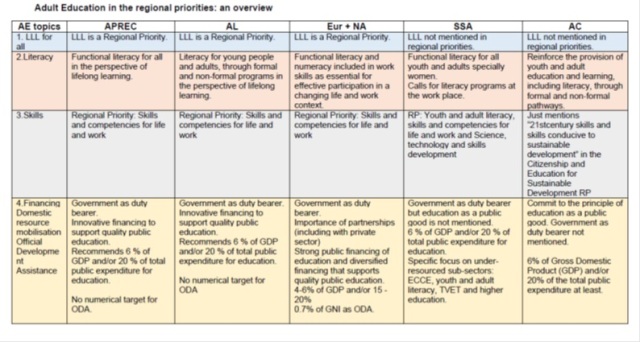
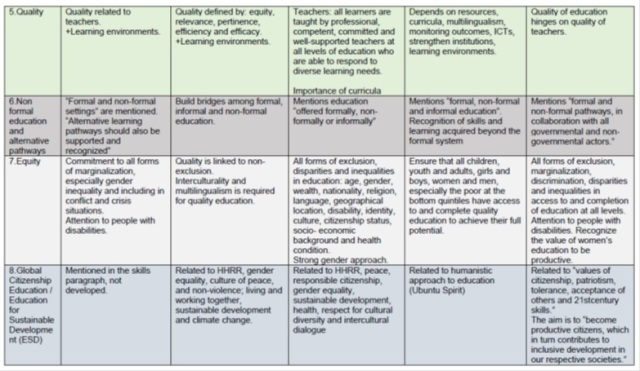
Comments on the table:
1. LLL for all
All of the 5 statements endorse either the overarching goal of the OWG (SDG4) – SSA, EUR+NA – or the one of Muscat – APREC, AC, AL. This way, they all call for LLL for all, or at least the promotion of LLL opportunities for all. However LLL is among the regional priorities in APREC, AL and EUR+NA, but not in SSA and AC, who both formulate it this way: Equitable and inclusive access for all.
2. Literacy
The five statements make no differentiation between youth and adult literacy. This is very positive and significant as both Muscat and the OWG focus on achieving youth literacy and numeracy and just increasing adult literacy and numeracy. Thus, the target is not universal. Adult education and literacy in a lifelong learning framework are an integral part of the right to education and illiteracy must be eradicated. All youth and all adults must reach a proficiency level in functional literacy and numeracy.
3. Skills
A holistic approach to life and work skills is maintained in APREC, AL, EUR+NA. It is not the case in SSA, nor AC. In SSA, the concept of skills is not very much developed. In paragraph 10 it is linked to science and technology and in paragraph 12, to literacy. The AC just mentions 21st century skills and skills conducive to sustainable development, but doesn’t develop or explain any of this.
4. Financing
The majority of the statements highlight the role of governments as the primary duty bearer for efficient, equitable and sustainable financing of education (except for AC). This is very positive. It is also important that they call for innovative financing is to support quality public education (except for SSA that doesn’t mention education as a public good). All this is very relevant as the character of public good of education must be preserved.
All of them recommend 6 % of GDP and/or 20 % of total public expenditure for education, except for EUR, that lowers it till 4-6% of GDP and/or 15 – 20%.
All of them call upon the GPE to recommit to increase, better target and coordinate official development assistance (ODA) in alignment with regional and national education priorities and plans.
5. Quality
The quality of education is considered in different ways. In APREC, EUR+NA and AC is very linked to teachers. APREC states that all learners are taught by qualified, professionally-trained, motivated, committed and well-supported teachers who use appropriate pedagogical approaches (very similar to the OWG target on teachers). EUR+NA adds that this must be at all levels of education and that they must be able to respond to diverse learning needs.
AL has a differentiated regional priority on Teachers and asserts the need to strengthen them as key actors of the education agenda post-2015 and avoid considering them as mere means of implementation as the OWG does.
Learning environments are also included in the quality regional priority. APREC, and AL call for “safe, healthy, gender-sensitive, inclusive and conducive to learning, mother tongue-based multilingual education, and comprehensive monitoring and quality assurance systems.” SSA calls for safe, free from violence, inclusive and gender responsive.
Europe adds the importance of curricula, and SSA calls for curricula that are relevant to global as well as the African context.
6. Non formal education and alternative pathways
Formal and non-formal settings and alternative learning pathways are recognized in all 5 statements.
7. Equity
In all 5 statements, equity refers to access but also to completion, processes and learning outcomes. All of them mention people with disabilities. EUR+NA and SSA maintain a strong gender approach.
8. Global Citizenship Education and Education for Sustainable Development (ESD)
This concept is addressed in different ways and there is not a unified definition. In AL and EUR+NA it is related to HHRR, gender equality, culture of peace, and non-violence, living and working together, sustainable development and climate change. SSA mentions the Ubuntu spirit. AC adds patriotism but doesn’t develop it. APREC doesn’t offer a definition.
Final remarks
We are only weeks before the World Education Forum in Korea, and a few months away to the final formulation of the Sustainable Development Goals and targets. The education goal and targets proposed to date are considerably better than the one stated in previous global development framework, the Millennium Development Goals, due to a great extent to the advocacy efforts of the EFA movement. Nonetheless, we still have margin for improvement, especially on specific education goals.
On youth and adult education and lifelong learning, ICAE and the education international community have fought over the years, and particularly in the post-2015 negotiations, to guarantee lifelong learning for all. The efforts have paid-off, but we must secure that in the Incheon Framework for Action and the SDGs lifelong learning isn’t mentioned only as a framework, but as a real need. This includes the need to guarantee universal literacy for both youth and adults. Also, to ensure real lifelong learning opportunities for all, the targets must refer to formal, non-formal and informal learning pathways, as they are recognized in all regional statements.
The importance of quality education have been a key element of the discussions and it is reflected on the proposals, however is not clear to all the concept refers to the education systems as a whole, in al its elements. We shouldn’t reduce or directly link it to learning outcomes, quantitative measurements, or even to the idea that private education ensures quality. To that matter, to ensure quality, free and compulsory basic education must clearly reference in the WEF outcome and SDG on education.
There are other issues to be highlighted, which need further discussion and specific reference in the post-2015 framework, e.g. comprehensive sexual education, civil society participation in the implementation and monitoring, and the central position of teachers, trainers and facilitators in the striving to guarantee quality education for all, among other. In these conclusion remarks, we want to underscore the need of further discussion and commitment of public financing and Official Development Aid (ODA) to education.
Governments are the primary duty bearer for providing inclusive, quality and equitable education. In the last 15 years ODA had a great weight in provision of education in low-income countries, in recent years development aid has stagnated, and it is predicted it will continue to level off. In this scenario we can’t allow the WEF doesn’t engage in a deeper reflection on the implications of ODA in the implementation of post-2015 education agenda.
Finally, despite [and due to] the lack of discussion on specific targets and indicators during the EFA regional conferences, and the fact that the indicator framework of the post-2015 agenda will remain up for discussion until March 2016, improvements to the current proposals should be discuss in Korea, and stated in the WEF outcome document.
World Education Forum 2015


